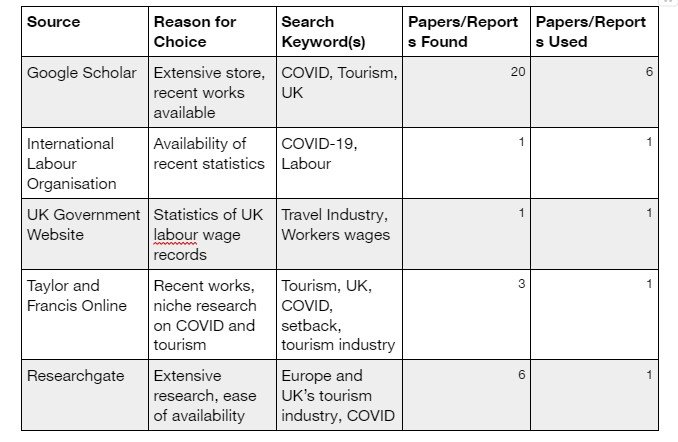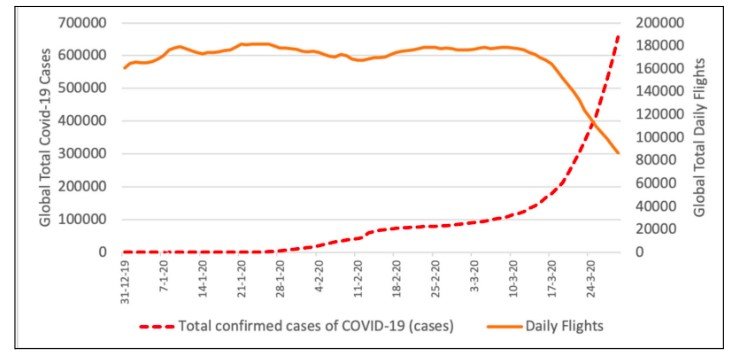Tourism Industry in UK During COVID
- 07 Pages
- Published On: 21-11-2023

Literature Review
Over the last several decades, increasing globalisation and technological advancements have led to a rapid expansion of the global tourism industry. The COVID-19 pandemic has imposed unprecedented restrictions on travel and public places, which has left the travel and tourism industry severely affected. While this paper will examine the damage dealt to the tourism industry in terms of the economic loss and social disruption, particularly in the UK, the paper will also explore how the pandemic gives the industry an opportunity to re-birth itself into becoming a more ecologically and fiscally sustainable. For students who are grappling with the complexities of these topics, seeking economics dissertation help can provide the best support in navigating through the intricate layers of economic research.


The pandemic led to wide spread economic, and by extension social damage. According to the International Labour Organisation (ILO), at its peak almost 81% of the global workforce was affected (ILO, 2020). The tourism industry was disproportionately affected as travel and movement became restricted, and most governments responded by arranging financial packages to mitigate the impact. In the United Kingdom, during the month of April and May, businesses in tourism and beyond were able to claim 80% of their employee’s monthly wages up to a maximum of £2,500 per employee so that the employees could remain employed and the businesses themselves got several tax benefits (Government of UK, 2020). Although the policy did help a lot of people, it did not cater to the workers in the unregulated and informal sector of the economy. Some studies have estimated that in the UK alone, approximately 4.7 million people worked in the informal sector alone, primarily those on temporary or on per-hour contracts, who have been the hardest hit (Ebata et al., 2020). There is a case to be made that the governments should extend their support to these workers because that will help bring them back into the declared economy, and by discouraging such unregulated businesses, it will serve to mitigate the unfair competition suffered by declared tourism businesses, potentially improve working conditions in the tourism industry but most importantly enable the government to collect higher revenues in taxes in future, thereby offsetting the short term deficit which will be incurred (Williams, 2020). The tourism industry is intricately connected with several other sectors, such as accommodation, food and beverages, travel sector and the local small scale businesses dependent on footfall. This makes it challenging to accurately quantify numbers, but according to data from the European Commission, approximately 10% of the total European workforce is directly or indirectly tied to the tourism industry, which amounts to almost 14 million workers (Eurostat, 2019A). Predictably, a disruption of such a massive scale, especially one which disproportionately affects people belonging to lower socio-economic strata, due to lesser savings and lack of government hand outs, will have social ramifications. Because of the very premise of the tourism industry, travelling, was challenged, the industry had to be completely shut down. The industry was over-saturated in the year 2019 (Dodds and Butler, 2019) and virtually extinct by the next year (Hall et al, 2020)
Gaps in Current Literature
Although literature from the beginning of 2020 has produced several sources of literature on the effect COVID had on tourism. However, the years preceding this, there has been little-to-no work on the effect of infectious diseases on the travel industry. Baker (2015) elucidated on the potential hazards caused by the transmission of SARS by travellers, but very little has been said about the entrenched effects on the tourism industry. Additionally, literature has not considered linking the present outbreak with the boom in population that took place in the last decade. Strielkowski (2014) considered the impact of population on infectious disease-waves. However, the perspective he took was one of examining the effect of infectious diseases on reducing populations, not the high-risk saturated societies face when a contagious disease breaks out. The most glaring issue that current literature is facing is the lack of adequate time in understanding this particular issue. Not even a year has elapsed since this disease has started adversely affecting the tourist industry. On top of that, most literature has to rely on secondary sources and cannot access the field to access primary data. Without primary data, it becomes difficult for literature to asses the long-term effects the tourism industry may face and predict outcomes to help them overcome it. Additionally, more work needs to done on alternative tourist industries, like local tourism and ecotourism that can keep the industry running, even in these limited scenarios (Romagosa, 2020). Take a deeper dive into New Zealand And Tanzania with our additional resources.

References
Monitor, I.L.O., 2020. COVID-19 and the world of work. Updated estimates and analysis.
GOV.UK. 2020. Coronavirus (COVID-19): Business Support. [online] Available at: https://www.gov.uk/coronavirus/business-support
Ebata, A. , Mader, P. , & Bloom, G. (2020). Precarious and informal work exacerbates spread of coronavirus . Institute of Development Studies
Williams, C., 2020. Impacts of the coronavirus pandemic on Europe's tourism industry: Addressing tourism enterprises and workers in the undeclared economy. International Journal of Tourism Research.
Ec.europa.eu. 2020. Tourism Industries - Economic Analysis - Statistics Explained. [online] Available at: https://ec.europa.eu/eurostat/statistics-explained/index.php/Tourism_industries_-_economic_analysis.
Dodds, R. and Butler, R. eds., 2019. Overtourism: Issues, realities and solutions (Vol. 1). Walter de Gruyter GmbH & Co KG.
Baker, D.M.A., 2015. Tourism and the Health Effects of Infectious Diseases: Are There Potential Risks for Tourists?. International Journal of Safety and Security in Tourism and Hospitality, 1(12), p.1.
Strielkowski, W., 2014. Modelling the impact of infectious diseases on tourism. Applied Mathematical Sciences, 8(92), pp.4571-4577.
Gössling, S., Scott, D. and Hall, C.M., 2020. Pandemics, tourism and global change: a rapid assessment of COVID-19. Journal of Sustainable Tourism, pp.1-20.
Romagosa, F., 2020. The COVID-19 crisis: Opportunities for sustainable and proximity tourism. Tourism Geographies, pp.1-5.
Dig deeper into The Significance of British Airways' Partnership with London City Airport with our selection of articles.
- 24/7 Customer Support
- 100% Customer Satisfaction
- No Privacy Violation
- Quick Services
- Subject Experts



